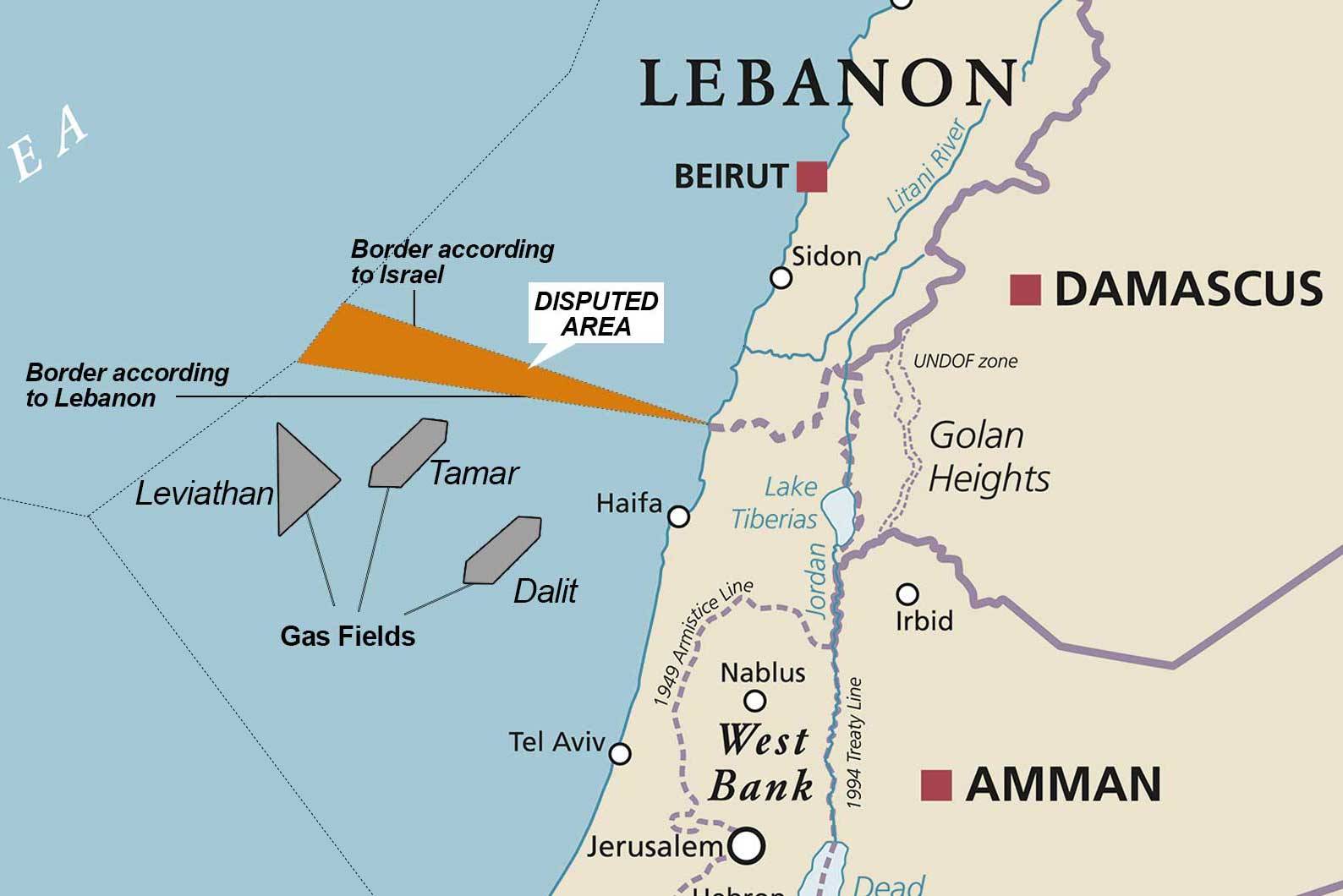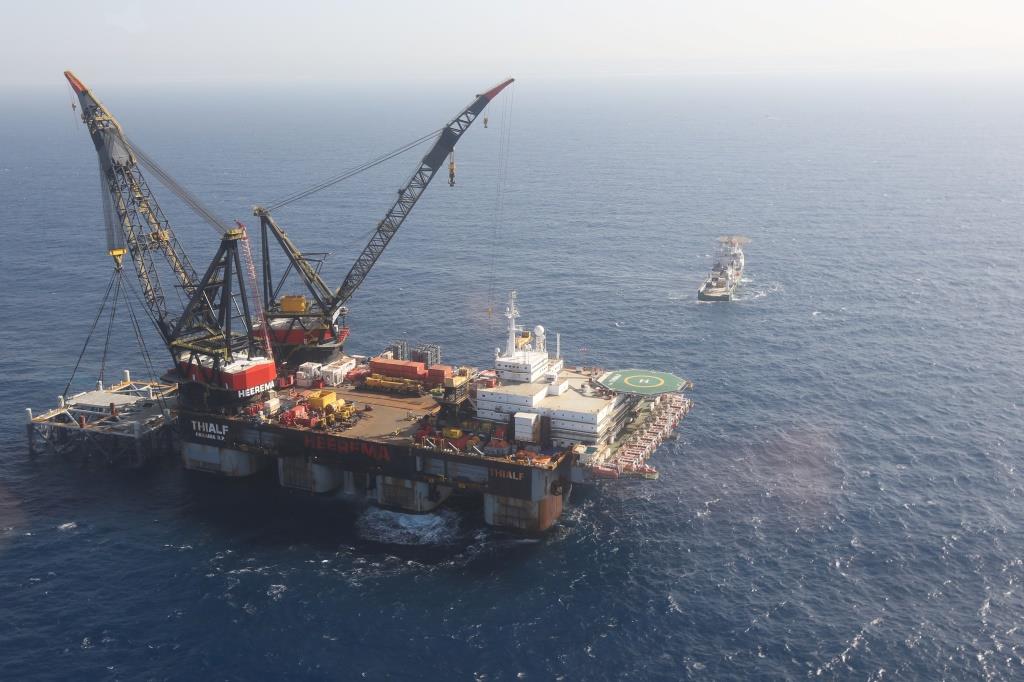In the coming weeks, negotiations are supposed to begin between Israel and Lebanon on demarcation of the maritime border between them. Agreement on forthcoming talks was reached following intensive efforts by United States Assistant Secretary of State David Satterfield, and it was decided that negotiations will be held at the UN facility in Naqoura, on the Israel-Lebanon border. Due to Lebanese opposition to American mediation, the United States will participate in the talks only as a facilitator. The conflict between Israel and Lebanon concerns an 860 sq km triangular area in the Mediterranean Sea, and stems from a dispute regarding the demarcation method (Israel marks the border as being at a 90-degree angle to the land border, while Lebanon marks it as a continuation of the land borderline). The issue grew more relevant and became an open conflict following the natural gas discoveries in the Mediterranean Sea. Lebanon, which wanted to pursue gas drilling off its coast, submitted its demarcation of the maritime borders to the UN ten years ago, making this area part its Exclusive Economic Zone. Israel, which saw this as an infringement of its rights, also submitted its version of the border demarcation to the UN.
The two countries presumably have a clear interest in reaching an agreement on the maritime border between them, mainly for economic reasons. In 2011, Israel asked the United States to mediate and assist in reaching agreement with Lebanon. Israel sought not to discuss the issue as part of the Joint Military Commission established through Security Council Resolution 1701, which was adopted at the end of the Second Lebanon War (2006), and in whose framework Lebanon demanded simultaneous discussion of the issues related to both the land border and the maritime border. Moreover, Israel opposed and continues to oppose a UN role in determining its borders, including its maritime border, in part because it is not a signatory to the United Nations Law of the Sea Convention. In the indirect negotiations that took place in 2011-2012, Israel agreed to the suggested compromise on demarcating the maritime border, making concessions to Lebanon and providing it with the greater share of the territory in dispute (with a ratio of 55:45), but so far Lebanon has not responded to this offer.
The dispute with Israel has slowed Lebanon’s development of its natural gas industry. Although foreign companies won tenders for exploration rights including in the disputed area, they quickly announced that they would not operate there. The Lebanese government’s current agreement to renew the negotiations, and this time in a direct manner, seems to have been made possible by the formation of the Lebanese government earlier this year, but it is clear that the main backdrop is the urgent economic need, due to Lebanon’s severe economic hardship (according to Moody’s 2018 credit rating, Lebanon is in third place among countries with the highest debt, which constitutes 140 percent of GDP). While last month Hariri’s government succeeded in approving an “austerity budget” for 2019, already – even before its approval by the parliament – the budget has triggered protests due to the salary cutbacks of public servants and army retirees, and due to the expected tax hike. It is estimated that this budget will continue to include a deficit, and will not lead to a significant change in Lebanon’s economic situation (Moody’s estimates that the debt will rise to 155 percent of GDP in 2023).
Moreover, it seems that there has been a change in Hezbollah’s position on the issue, as Lebanon’s willingness to negotiate would not have been possible without this organization’s approval. Hezbollah gained an added strength in the last elections and is currently a leading and influential power within the Lebanese government . Hezbollah recognizes the expected economic benefit to Lebanon of pursuing natural gas drilling in the sea, and more importantly, the organization itself expects dividends, in light of its economic difficulties following an increase in its expenditures (due to its involvement in the war in Syria) and a reduction in its income (following the American sanctions on its patron Iran, as well as the direct sanctions imposed on the organization itself). This change in Hezbollah’s position increases the chances of reaching an agreement, as the organization’s involvement in the government also forces it to address national considerations that weigh on issues related to Lebanon-Israel relations. However, difficult and complex negotiations are expected in any case, as the Lebanese will likely demand a greater portion than what may have been offered to them in the past, but that is not a sufficient reason for Israel to agree to a different formula than what was presented in the past and already included the Israeli concession of the 55:45 ratio.

Israel began gas exploration in the Mediterranean Sea 20 years ago. The enormous investments in mapping the potential reserves, estimating their economic value, launching exploratory drilling, and building the infrastructure for producing and transporting the gas to Israel proved justified when the Israeli economy began transitioning to an energy source that is cheaper and cleaner than oil and coal. Today, over two thirds of the electricity produced in Israel comes from natural gas, and in addition to its advantages over other energy sources, the royalties from gas production enrich the state’s coffers. A solution to the conflict with Lebanon will not change the supply of natural gas for Israel, as existing amounts are enough to supply Israel’s internal needs even in the long term, including the ability to meet contracts to supply gas to parties outside of Israel, such as the Palestinian Authority, Jordan, and Egypt.
However, a resolution of the conflict with Lebanon would also have strategic implications vis-à-vis Lebanon and in the regional context. The key question is: would reaching an agreement serve as an incentive for Hezbollah to maintain calm along the border with Israel? Given the Lebanese political reality, presumably each of the actors in this arena, including Hezbollah, has been promised its share in the expected income from the gas. Some also claim that with Hezbollah’s increasing hold over the government, its sense of responsibility toward the Lebanese state has grown. All of these – in addition to its other difficulties – could contribute to a desire to maintain calm on the border with Israel.
In the regional context, if an Israeli-Lebanese agreement is reached, the two countries could jointly examine the possibility of pursuing a regional gas transport system from the Eastern Mediterranean to Europe (an important potential market for gas from the Eastern Mediterranean), with the participation of Egypt and Cyprus. There are three main alternatives for transporting the gas to Europe: liquefaction facilities in Egypt and/or Cyprus and from there in tankers to European ports; a pipeline from the Eastern Mediterranean to a destination in Europe; and a relatively short pipeline that would connect to the pipeline system in Turkey as a market and conduit to Europe. The high cost of each of these alternatives would require all of the countries in the Eastern Mediterranean to agree to joint use of the transportation facilities in order to justify the investments, which would come from outside the region.
An agreement on the demarcation of the maritime border is an essential but not exclusive step for beginning gas exploration and production operations in the area in dispute. It is likely that gas found in this region would be part of a field whose borders would deviate from the borders of the area determined in the agreement. If the border demarcation issue is resolved, then Israel and Lebanon would need to reach a unitization agreement (an agreement on the division of profits from production in this region), which could also be delayed due to a dispute between the sides. Lebanon and Israel can avoid a delay if they agree to entrust the technical-economic decision on the issue to the companies that would have the rights on the two sides of the agreed-upon borderline, while they would reserve the right to approve such an agreement.
In any case, despite the joint interest in reaching an agreement, a difficult and complex set of negotiations lies ahead that will require suitable preparations on the Israeli side. Given the complexity of the issue and the broad implications of these negotiations for Israel’s national security, a designated inter-ministerial negotiating team should be, similar to the teams established prior to the negotiations with the Palestinians (before the Camp David Summit in 2000 and the Annapolis process in 2007-2008), headed by a senior figure with experience in negotiations management. The establishment of such an administration is all the more important in light of Lebanon’s connection between the issue of the maritime border and the issue of the land border. These issues are under the responsibility of different ministries and require the involvement of many parties within the security and political establishments. Thus, the first part of the negotiations on the issue of demarcating the maritime border should be led by the National Security Council and the Ministry of Foreign Affairs and include mapping experts, while the second part of the process, following agreement on the demarcation of the border, should include economic and energy experts.
INSS Insight No. 1180, June 24, 2019
www.inss.org.il/publication/negotiations-israel-lebanon-maritime-border/?utm_source=activetrail&utm_medium=email&utm_campaign=INSS%20Insight%20No.%20




